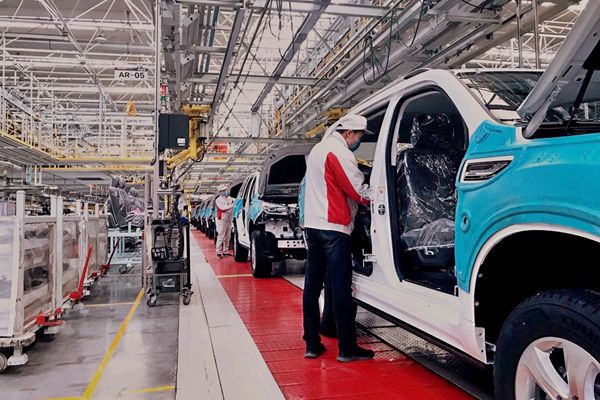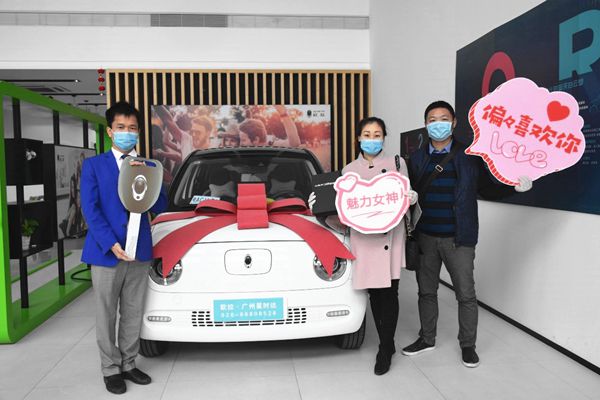
Employees work in the production plant of Great Wall Motors in Chongqing, China, in February 2020. [Photo courtesy of Great Wall Motors]
Carmakers in China began to resume work and production before mid-February after the Chinese New Year holiday, which was extended due to the COVID-19 outbreak.
Traditionally, business people would make wishes for a flying start of the new lunar year. Instead, what awaited these auto companies this February was a tough time with obstacles abounding.
According to data from the China Passenger Car Association (CPCA), the country's passenger vehicle sales plunged around 80% compared with a year earlier.
Geely, one of China's biggest auto brands, reopened its showrooms after the holiday, but some saw fewer than 10 customers a day.
However, the company noticed that a higher ratio of these visitors decided to buy, and realized that most people coming at such a time were in urgent need of a car.
To meet this pressing demand amid the outbreak, Geely turned to its online sales channels. On Feb. 10, the first day when the employees of its headquarters began to resume work, the company rolled out a new service: delivering cars to doorsteps for customers to test drive and purchase.
The service required customers to first pay an online deposit of 2,000 yuan (US$281.21). It would also help buyers with registering for license plates and signing up for insurances.
Geely's e-commerce company saw the number of its orders from Feb. 10 to 16 increase 586% year on year, and 2,402% month on month.
Another Chinese carmaker, Great Wall Motors, also stepped up its online marketing efforts soon after the holiday. It offers consultation and order placing services online, as well as virtual reality and live video car viewing options. Moreover, the company actively promoted its cars over China's popular livestreaming platforms together with its distributors.

Customers buy a new Great Wall Motors car in Guangzhou in February 2020. [Photo courtesy of Great Wall Motors]
Others also took advantage of livestreaming channels to advertise throughout the outbreak. Tesla and SAIC Motor even had senior managers themselves in front of cameras to boost sales.
These online activities have become quite important with the drastic drop in showroom customers, according to the China Association of Automobile Manufacturers (CAAM). It wrote in a recent report, "Active online marketing can help distributors maintain communication with targeted consumers, and facilitate the decision-making of eager buyers during the outbreak."
The report also said that sales are expected to rebound as pent-up demand unleashes after the epidemic is under control.
For some auto companies, the rebound has already begun. "Deliveries are growing again in March, and are slowly beginning to normalize," said Volkswagen CEO Herbert Deiss at the company's 2020 annual media conference.
A part of the recovery could be attributed to government support. Changsha, the closest Chinese provincial capital to the COVID-19 epicenter Wuhan, launched a new policy on March 14 to help its local automakers: Through June 30, people who buy cars made in Changsha could get a Changsha license plate and the government would offer subsidies of up to 3,000 yuan per car.
The next day, showrooms saw surges in both foot traffic and deals reached. The Xingsha exhibition hall of Shanghai Volkswagen in the city received 40 groups of customers and sold three Lavida models, which was covered by the subsidy policy. The visitor number was still half the normal amount, but 20% to 30% higher than the previous weekend.
Guangzhou, the capital of south China's Guangdong province, also implemented its own subsidy policies in March. In addition, the city announced more incentive measures on March 20 specially to boost the consumer spending in the automobile sector. The measures cover aspects like encouraging purchases of new energy vehicles, facilitating technological upgrading, and creating a sound environment for auto-related consumer spending. In addition, Foshan, Xiangtan and Zhuhai also launched their respective policies.
On March 18, China's Ministry of Industry and Information Technology announced on its website streamlined policies facilitating new model launches, loosening restrictions on application documents, and extending the grace period for companies to rectify problems.

Customers submit to body temperature check at a Great Wall Motors store in Chengdu, China, in February 2020. [Photo courtesy of Great Wall Motors]
According to the weekly reports of CPCA, the retail sales in the last week of February as well as the first and second weeks of March were down 61%, 50%, and 44%, respectively, from last year, suggesting a stable improvement on a weekly basis.
Concrete policy effects may not be seen until April, the latest weekly report said.
According to documents from Geely and Great Wall Motors, the two companies are anticipating sale increases after the outbreak from pent-up demand. Both also believe that, despite the epidemic's impact on production and sales, the effects would not last long.
Meanwhile, international carmakers are also expressing confidence in the Chinese automobile market after witnessing China's efforts against the COVID-19 outbreak.
"The crisis management in China seems very successful from where we stand, so we have hopes that our business in China could wrap up with a quite satisfactory annual result," Deiss said at the livestreamed Volkswagen media conference.




